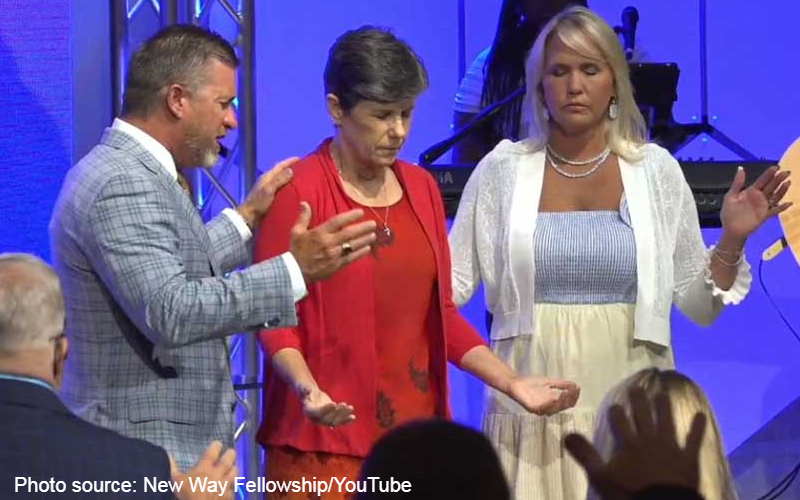The latest State of the Bible report by American Bible Society shows an increase in Bible use and scripture engagement for the first time in four years. The numbers equate to 3% more American adults – a total of 10 million – reading the Bible outside of church. That’s good news for The Good News.
In 2024 the study showed 38% of Americans qualified as “Bible users,” an historic low, Dr. John Plake, chief innovation officer at American Bible Society, said on Washington Watch Thursday.
“That was the continuation of a downward trend that we had really seen since COVID set in. COVID caused a spike initially in Bible use, and then it just fell off a cliff,” Plake told show host Tony Perkins.
The threshold is low for a “Bible user” as a quantitative method, but the bar had to be set somewhere, Plake explained. So, American Bible Society defines a user as one who reads the Bible at least three times a year while not attending church.
“Of course, many of them read the Bible much more frequently than that, but we’ve got to draw the line someplace,” Plake said.
As the numbers declined “we began to scratch our heads and wonder if this was ever going to come back,” he explained.
Men in the driver’s seat
Now there are signs of a turnaround with men leading the way.
“We often think of Bible users as being anchored by women in America. They have a deep faith; moms and other women in America are deeply engaged with the Bible typically. Yet what we saw [in the report] was that women were statistically unchanged from 2024. That’s not a bad thing.
“But what we saw interestingly was that men increase their Bible use by 19% year over year. That really closed the longtime gender gap in Bible use,” Plake said.

Men aren’t the only surprising demographic. Millennials and Generation Z appear to be turning to the Bible as well. Pew Research Center defines Millennials as those born from 1981 to 1996, a generation often characterized by their online acumen and familiarity with technology and social media.
Now the older millennials are approaching their mid-40s.
“The Millennial generation has been in the doldrums for quite some time, really one of the least engaged generations in America, but they saw a 29% increase in Bible use in that generation alone,” Plake said.
ABS findings are in line with other encouraging news about the Bible worldwide, Plake said, citing a recent look at England and Wales by the British and Foreign Bible Society which showed a “warming” to the Bible by Gen Z.
Gen Z covers those born between 1997-2012. Only four percent of that group had a biblical worldview, according to 2018 research.
Not only was Gen Z not engaged biblically then, but atheism was on the rise, the Impact 360 Institute found. Teens, then, were twice as likely as adults to identify as atheists.
Now Gen Z is showing a “warming toward the Bible and a warming toward God,” Plake said.
Later this month comes the release of The Patmos Study, which will look at global Bible use. “There were over 90,000 interviewed in that study along with the Gallup World Poll,” Plake said.
The encouraging evidence is not only analytical but anecdotal.
“We're hearing things coming off university campuses with young people crowding into gospel-focused meetings or crowding into churches. Churches outside [England’s] Oxford University are beginning to fill up with young people who I think are having an openness to the gospel that maybe their parents' or grandparents’ generation never had. They’re searching for something more,” Plake said.
So, why the reversal of a downward trend? People searching for answers amid global conflict and uncertainty could be one conclusion.
The importance of disruption
Plake is on board there, noting that “disruptions that kind of take people out of living their life” are certainly a factor.
“That creates an openness to maybe there's something more here. Maybe the assumptions that I've had about the world, about how it works, about who I am and who others are, those might not be as useful in these disrupted times.”
But those disruptions don’t have to be bad things, Plake said. “It can be good things. They can become parents for the first time. We think some of the parenting challenges may be driving what we're seeing among the Millennial generation.”
The increased presence of biblical-themed movies and media – the web-streamed television series "The Chosen" for example – is also having an impact, he suggested.
“The production companies that stand behind these kinds of Bible-based features are realizing that there is a yearning for something more and that audiences are coming. It would be different if they were putting out this content and nobody showed up, nobody had any particular interest in it – but that's not the case.”
Whether good or bad disruptions tend to cause people to “reach for the Bible, we’re certainly seeing them do that in fairly significant number,” Plake concluded.







